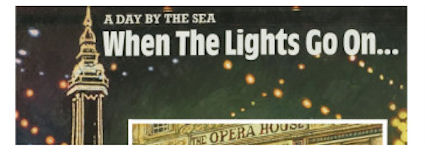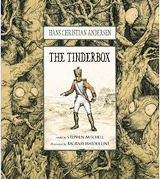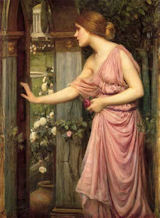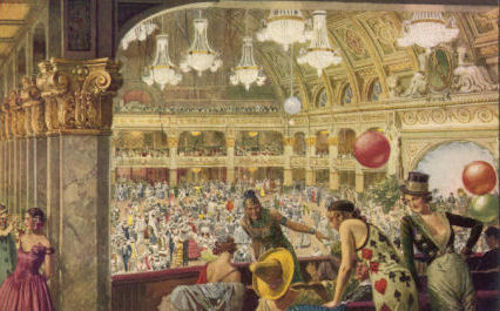




Natalie dresses for the second meeting with her young man in a different manner than the first: this time the liaison is at her invitation and he'll have to take her as she is. Her choice is a simple attractive skirt and top and jacket rather than the too-tight top and jeans she assumed was expected. Ripley walks in unexpectedly just before she leaves.
A thousand times we have watched this scene where a wife's straying is portrayed as justified by the hateful neglectful behaviour of her husband. Natalie doesn't ask for much: just that he tell her he loves her — not every day, but once.
Ripley is unable to perform this simple act of kindness.
...
A thousand times we've
watched this tragic scenario, but never while
laughing uncontrollably, from the moment Ripley replies,
Don't start on me to Natalie's
guilty greeting, Oh. Hello, darling,
to his unforgivable, I don't have
time for your games, Natalie,
as a response to her sudden demand:
What if you walked out that door tomorrow and died? What if
this was your last chance to say you loved me?
Both members of the couple end the encounter justifiably feeling wronged by the other.
Because Ripley's answer is not at all unforgivable, from his point of view.
Has he come home unexpectedly in order to confide in Natalie at last? To share with her his worry and heartbreak at the behaviour of their son Danny, who has displayed an incomprehensible regard for the truth by contradicting Ripley's testimony that the aptly-named victim Mike Hoolie was never in the arcade on the night of his death? To explain to her the misunderstanding that has given one more reason for suspicion to a certain detective named Carlisle, who has already taken Ripley in unaccountable dislike?
No matter. Secure in a certainty that if blame is to be apportioned she is no more to be criticized than any other human female and without a backward glance Natalie leaves him alone in their beautiful house and walks out all unknowingly to meet the detective Carlisle.
He doesn't show. She has Carlisle's number from the Samaritan meeting, and calls him. At first he doesn't answer, then reluctantly picks up the phone. She comes to his hotel room.
________________________
That's not all we have to worry about. Not by a long shot.
It wasn't only Natalie and Carlisle calling upon infernal Cupid to help with the progress of their affair. We also assisted while Shayanne stood on the darkened street gazing upward at a lighted window and singing to her oblivious and perfidious boyfriend Steve, who has indeed been frightened off by Ripley.
And Danny. We saw him with the hooker Hailey outside her room in the White Cliffs Flats belonging to Ripley. But in Episode One we saw her in the same doorway exchanging a meaningful glance with a rampaging Ripley and his investor friends on the morning following the opening party. This too has to end badly.
Analyzing a Fairy Tale, or other creative work, is madness, of course, showing the crassness of our outlook and the limitations of our mentalities — like valuing gold by its price on the metals market. What is the significance of Ripley playing his slot machines until the clicking into place of three identical icons? — not trios of cherries and lemons but of a satisfied Ripley — and increasingly often during the course of the episodes of Carlisle in one infuriating pose after another.
Is it the equivalent of the Wicked Queen and her magic mirror from Snow White? Ripley may not be asking Who is fairest of them all? but rather an implied How am I doing? and What do I have to be concerned about? Unfortunately for Ripley, his 3-2-1 Nudge is no more reassuring than the Wicked Queen's reluctant looking glass.
________________________
The encounter in Carlisle's hotel room goes not at all as expected. Something is wrong. And Carlisle is suddenly unyielding and inaccessible.
We have so many questions. Why is Carlisle rejecting Natalie after propositioning her so efficiently a few scenes back? There must be some mistake? She suspects he may be losing interest now that conquest is assured.
I listened to what you said, he reminds her. I don't know if either of us are ready for this.
Fairy Tales have been around for centuries, if not millennia. No one knows why some remain well-loved and seemingly relevant, while others fall out of fashion. Why is Pride and Prejudice still read with pleasure two hundred years after its first appearance? Perhaps the attraction lies in what isn't shown, or said, rather than what is? (See Did Darcy Lie to Himself? Or Only to Jane Austen? well on the way to completion until a certain Sunday in August ...)
Which is to offer the opinion that at this point in Blackpool, we appear to be travelling some distance and in a different direction from the Little Red Riding Hood morphing into Jack and the Beanstalk Fairy Tale we thought we were visiting. I still maintain the relevance of The Tinderbox insofar as Natalie is concerned, with the Soldier sending for the sleeping princess to be brought to him through the streets of a sleeping city. He knows all about her; she knows nothing of him nor of his intentions.
On the other sde, perhaps we were never headed toward Jack and the Beanstalk, its story containing nothing at variance with the emotional heft of a detective seducing the wife of the main suspect in order to obtain sufficient information to secure a conviction.
Let us be clear:— Jack In The Beanstalk is a tale of plunder and rapine, as shown by the golden harp crying out for her master to rescue her, a call that results in the Giant's death as he sets out in pursuit.
A Fairy Tale such as The Princess on the Glass Mountain, on the other hand, contains a hero of noteworthy purity of heart, pursuing a quest remarkably free from greed and self-interest. (Unnecessarily graphic descriptions of suffering not only by the manly solitary hero but by unsuccessful suitors and their noble steeds sliding down to terrible deaths at the mountain's foot somewhat mar the telling of this story, for adults no less than children. But you can't have everything in life and Fairy Tale.)
When we were children, a princess would wait patiently at the top of the glass mountain in order to be rescued. Isn't our present hero finding the purity of his quest in danger of compromise by the sight of Princess Natalie down to her underwear frolicking on his bed in a highly provocative manner?
The music is by Smokey Robinson. The Miracles. And Carlisle:—
Maybe you want to give me kisses sweet
But only for one night with no repeat ...
What follows is maybe fantasy. Maybe not. Nobody tells us anything. But that's certainly Natalie laughingly engaged in a mock pillow fight.
Maybe you think that love was made for fools
So it makes you wise to break the rules
Oh little girl in that case I don't want no
part
That would only break my heart
Oh, but if you feel like loving me,
If you got the notion
I second that emotion ...
Said, if you feel like giving me
A lifetime of devotion
I second that emotion.
Very sweet and praiseworthy, especially since their lovemaking appears to be limited to mere fantasy. We foresee certain obstacles before a lifetime of devotion is likely to be realized, but who are we to cavil at a Fairy Tale?
After the romp we see Natalie and Carlisle wrapped in each other's arms. He touches her cheek in affection, thankfulness, and gratitude, and the contrast with She's Not You could hardly be more marked. We've seen that affectionate gesture before in this Episode Two. Twice before.
First in the grubby White Cliff Flats, as Hailey pats Danny in reassurance.
And secondly also by Carlisle. Carlisle is a tactile person. He touches people easily, even stepping over the body of the wretched Mike Hoolie to offer his hand to a reluctant Ripley on the occasion of their first meeting in the arcade. We also see him patting D.C. Blythe briskly on the cheek while congratulating the latter on his orthodox investigating methods. We might think the gesture as bullying by a superior if we didn't see Blythe's grin and triumphant offer of even juicier information gathered by orthodox procedure.
It must be admitted that only after several viewings did we realize that this whole bedroom scene is fantasy — thank heaven for VCR and later DVD recorders — and that we should have been paying more attention to the elliptical conversation between a vastly sobered and unrumpled Natalie and Carlisle in the doorway of the hotel room as she takes her departure:—
I've finally realized what you've known all along, Peter. This is nothing more than a nice little fantasy.
That night in their bedroom an almost tearful Natalie asks Ripley for reassurance, just as though she hadn't figuratively set fire to the living room curtains by placing that telephone call hours earlier:—
We will be all right, won't we, Ripley?
To which he replies,
Of course we will.
. . . . .
Watching these first two Episodes is less like watching television and more like playing one of Ripley's 3-2-1 Nudge slot machines than might be imagined. I once heard a compulsive gambler maintain that no matter what icons the slot machine throws up, the thrill is in pulling the handle and initiating play, and only habit and inertia keep him from walking away without verifying whether he 'won' or 'lost'.
The same morbid excitement constitutes for me the attraction of Blackpool's first two Episodes. What happens next will be a disappointment no matter if the Big Bad Wolf gobbles up Red Riding Hood, or not. It's The Game of Love and Chance, deeper and more exciting than anything Marivaux ever wrote, the stakes being a murder, a marriage, a family, a business, and, crucially, one's standing in the community.
Next: Episode Three, when Fairy Tale will probably cede inevitably to Myth and there's nothing more we can do to bring all these people to reason.
________________________